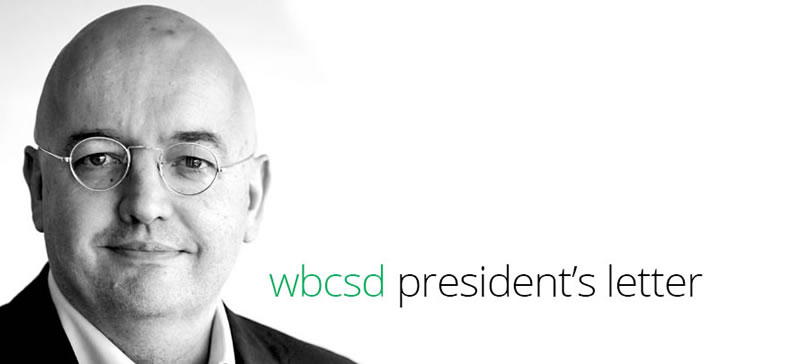Dear,
The World Economic Forum in Davos, the first important international gathering of the year for political and economic leaders, has just come to an end. The WEF chose the “Fourth Industrial Revolution” as the overarching theme of this year’s meeting. However, there were also many workshops and meetings building on the success of 2015 in which we saw the adoption of the SDGs and the Paris Agreement. The words “implementation” and “action” were the ones that were heard most in those sessions.
This is where business has the biggest role to play. Business is a long-standing master of innovation, and it must channel scientific progress towards the goal of building an inclusive and thriving low-carbon economy. In order to achieve the SDGs and Climate Agreement goals, business must also ensure that sustainability becomes an integral part every company’s strategy, decision-making and disclosures. Lastly, Davos made clear that business – just as government and civil society – must be held accountable for the promises made in Paris.
Probably the most positive signal coming out of Paris and carrying over to Davos was the growing number of financial players getting involved in the discussions. Insurance companies, asset managers, pension funds are all beginning to understand that they need to get involved in understanding the changing risks. The next few years will see new opportunities emerge for companies to provide investors with a full performance profile that reflects environmental and social impacts as well as financial ones. The work of the Task Force on Climate-related Financial Disclosure, led by Mike Bloomberg and Mark Carney, will make important progress in that area.
The SDGs are the global framework for addressing the systemic issues our societies face. One speaker in Davos referred to the SDGs as the agenda for a zero poverty and zero carbon world. The SDGs also represent new strategic investment and business opportunities intricately tied to societal progress and environmental protection.
For this reason a dedicated commission was launched in Davos to help business understand the opportunities presented by the SDGs. The Global Commission on Business and Sustainable Development will work over the next 12 months to quantify the economic rewards of investing in sustainability through new markets, investment opportunities and innovations. It will build a roadmap for all stakeholders to collaborate in the delivery of the SDGs, but most importantly, for business to get truly engaged in implementing the solutions to achieve them.
By introducing new measures of prosperity and performance, the SDGs will promote sustainable consumption and production patterns. This will in turn unlock unrealized market potential worth tens of trillions of dollars that significantly outweigh the initial investment costs.
Forward-looking companies are already integrating sustainability at the core of their decision-making. We were honored to see our US Materials Marketplace business solution, developed in collaboration with the USBCSD and Corporate Eco Forum, receive the prestigious Circulars Digital Disruptor Award in Davos.
For WBCSD members, 2016 presents numerous opportunities to get engaged and contribute to the SDGs and climate solutions. You’re encouraged to join the Low Carbon Technology Partnerships initiative that has brought together over 150 global businesses and 70 partners to work collaboratively on the climate challenge. LCTPi will start implementing its ambitions and present outcomes at COP22 in Morocco at the end of the year.
This year’s IUCN’s World Conservation Congress in Hawaii during September also provides opportunities to get involved in crucial matters related to ecosystems, landscapes and conservation. The event will gather over 8,000 leaders and decision-makers from government, civil society, indigenous peoples, business, and academia. It’s a major opportunity to amplify your voice and showcase the innovative solutions your company is leading.
Action in cities is also critical for many of the SDGs. More than half of the world population lives in urban areas, and by 2050 it’s estimated that 70% of the population will be city-based. As part of our work program on cities, we offer your business significant engagement opportunities with cities within the framework of Habitat III, United Nations Conference on Housing and Sustainable Urban Development, taking place in Quito in October.
Sustainable business lies at the heart of sustainable development. It is the only option for building a safe and resilient world where prosperity is shared and poverty is history. Let’s make 2016 the year of implementation – and the “Fourth Industrial Revolution” a sustainable one.
All of us at the WBCSD look forward to working with you throughout this journey. We will help you navigate the busy agenda, get your company ready to engage where you can be most effective and assist in creating the tools to best present your progress to the (financial) markets.
.
Warm regards,
Peter Bakker
President & CEO, WBCSD
 Cs
Cs
